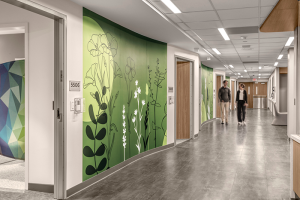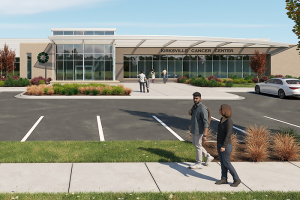Get a sneak peek of the 2024 PDC Summit

Image from Getty Images
Thousands working in all disciplines of health care planning, design and construction (PDC) will gather from March 17-20 in San Diego to share perspectives on designing, building and optimizing the health care physical environment at the International Summit & Exhibition on Health Facility Planning, Design & Construction (PDC Summit).
The PDC Summit is hosted by the American Society for Health Care Engineering (ASHE) of the American Hospital Association (AHA) in collaboration with 10 other leading health care PDC and clinical organizations. It offers a collaborative approach to building and renovating facilities that mirrors real-life PDC stakeholder collaboration across professions and career stages, with attendees including hospital administrators, health care facilities management professionals, architecture and interior design professionals, contractors and construction professionals, and clinical care providers, among others.
Attendees will learn about new best practices, discuss their findings and challenges, discover solutions to complex issues and stay informed about developments in the health care PDC field. They can expect:
- Peer-to-peer knowledge sharing that reflects real-life collaboration in the field.
- Timely and innovative sessions from leading experts.
- The latest solutions from vendors.
- Continuing education credits, like the Certified Health Care Constructor, as well as certifications from the American Institute of Architects (AIA), The Center for Health Design, American College of Healthcare Executives, Nursing Institute for Healthcare Design and others.
Keynotes and general sessions
The PDC Summit will feature a packed schedule of breakout sessions covering eight learning topics (i.e., behavioral health; clinical perspectives; collaborative PDC methodologies; safety and resiliency; site of care; sustainability and decarbonization; regulation and compliance; and research, design and outcomes) at four different learning levels (i.e., strategic, applied, exploratory and foundational); a program of sessions developed by The Center for Health Design; and a world class exhibition of products and services providers.
Additionally, the event will feature engaging keynotes and general sessions, including:
Opening keynote: “The Courage to Go Together: Three Questions to Change How You Work, Live and Lead” — In this inspiring keynote, Shola Richards, founder and CEO of Go Together Global and a best-selling author, will introduce the transformative concept of Ubuntu, which translates to “I am, because we are.” The Ubuntu philosophy, along with three powerful questions, will guide audience members toward actionable strategies to transform their work culture, amplify team civility, and inspire themselves and others to consistently bring their best to their work.
Keynote: “Augmented, Virtual and Extended Reality: How AR/VR/XR Are Reshaping Health and Medicine” — Delve into the fascinating ways augmented, virtual and extended reality (AR, VR and XR) are reshaping health and medicine. Daniel Kraft, M.D., a world-renowned health care futurist, physician-scientist, inventor and innovator, will share insights on how AR, VR and XR have a wide range of applications across health care and biomedicine. In this keynote, he explores many of the cutting-edge use cases and future potential of these technologies, including in medical education through simulation and training; as a virtual collaboration tool; and through virtualized health care.
Keynote: “The Human Implications of Generative AI” — With new technologies pushing the frontiers of what’s humanly possible, the rules of innovation have radically changed. A quantum physicist-turned-entrepreneur, Radhika Dirks is the CEO and co-founder at XLabs, a company making artificial intelligence moonshots a reality. In this thought-provoking talk, Dirks discusses how to know when the existing tools for innovation are no longer applicable, and how to swap them with new, next-generation methods. Audiences will leave with a newfound perspective on how their organizations can stay fresh, smart and relevant — and make the world a better place.
General session: “Prescribing Sustainability: Exploring Multifaceted Paths to Hospital Decarbonization” — Decarbonizing health care facilities is an important and necessary step in mitigating the effects of climate change. Health care organizations are pioneering change and developing innovative solutions for reducing their carbon footprints. This session, led by a panel of health facilities experts, will explore a diverse range of strategies backed by real-world case studies that have reduced carbon emissions within health care facilities. Panelists will discuss cutting-edge techniques and technologies employed in the construction and retrofitting of hospitals to optimize energy efficiency, reduce carbon emissions and decarbonize. They will provide insights into innovative approaches to minimize their impact through the use of inhaled anesthetic agents. Finally, panelists will explore sustainable food practices and electric vehicle solutions that have led to a reduction in greenhouse gas emissions.
General session: “The Future of PDC&O: How Will We Overcome Our Field’s Challenges?” — Technology, labor shortages and supply chain issues continue to wreak havoc on health care design, construction and operations. Each Supporting Organization of the PDC Summit has developed its own strategic approach to address these obstacles. In this session, their representatives will discuss the challenges they see on the horizon for each of these branches of the field and detail the strategic initiatives they are embarking on to address these issues. The panelists will explore how leaders in each aspect of health care can work together to address these challenges moving forward.
Closing general session: “Political and Regulatory Update” — AHA and International Code Council federal and government relations staff will collaborate to provide an update on the current political environment as well as legislation and regulations that impact hospitals and health care systems, including hospital codes and standards. The speakers will also discuss current AHA advocacy efforts to help advance the health of individuals and communities across the nation.
Add-on events
Last, but not least, is a roster of add-on events that allow attendees to take deep dives into health care PDC concepts with respected faculty from ASHE, the American College of Healthcare Architects and the AIA Academy of Architecture for Health, among others.
The Center for Health Design joins the PDC Summit
The American Society for Health Care Engineering (ASHE) recently announced that The Center for Health Design has joined the 2024 International Summit & Exhibition on Health Facility Planning, Design & Construction (PDC Summit) as a Supporting Organization and strategic educational collaborator.
The Center for Health Design is the latest institution to join a cohort of organizations that jointly produce the PDC Summit, and as a Supporting Organization, it will add years of architecture and design conference expertise and significantly expand the breadth of research and educational content offered at the event.
Other Supporting Organizations include ASHE; the American College of Healthcare Architects; Academy of Architecture for Health, a Knowledge Community of the American Institute of Architects; Association of periOperative Registered Nurses; Association for Professionals in Infection Control and Epidemiology; ASHRAE; Facility Guidelines Institute; International Association for Healthcare Security and Safety; Nursing Institute for Healthcare Design; and the American Academy of Healthcare Interior Designers, which also recently joined the event.
“The PDC Summit has always been about bringing thought leaders together from all corners of the field to confront challenges in health care planning, design, construction and operations,” says ASHE Executive Director Lizzie Ortolano. “Solutions to these challenges can’t come from just one area alone.”
By welcoming The Center for Health Design as a PDC Summit Supporting Organization and strategic collaborator, ASHE and its fellow summit organizers will expand the exchange of research, education and expertise and create more opportunities for networking between each organization’s members. The collaboration will also elevate The Center’s roster of initiatives, including its Evidence-Based Design Accreditation and Certification program.
“After years of collaborating with ASHE on initiatives to advance the use of design research to improve health care outcomes, we’re excited to take our relationship to the next level,” says Debra Levin, Hon. FASID, EDAC, president and CEO of The Center for Health Design. “Working with ASHE and the American Hospital Association, we look forward to building a solid and enduring bridge between the design and health care communities that will lead to new innovations in health care design.”




